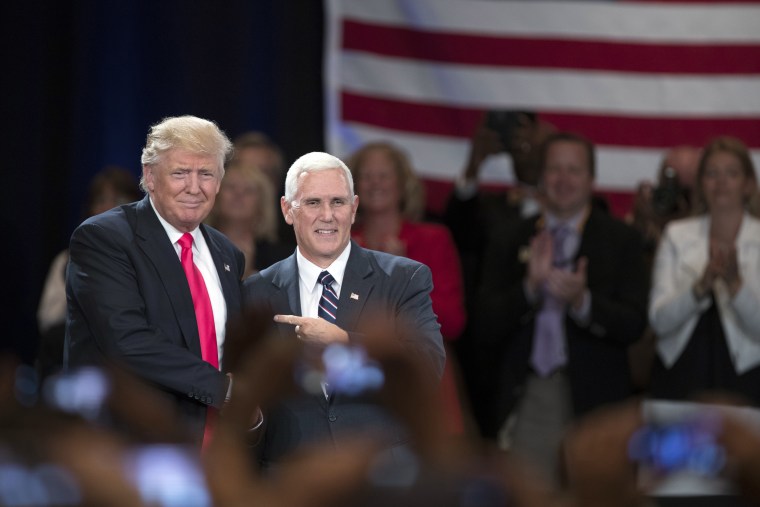Ahead of the government shutdown deadline two weeks ago, Vice President Mike Pence approached Senate Democratic leaders with something he saw as a compromise. Donald Trump may be asking for $5 billion in taxpayer money for a border wall, but, Pence told Senate Minority Leader Chuck Schumer (D-N.Y.), the White House would accept $2.5 billion.
Schumer, not surprisingly, dismissed the proposal -- the Democratic position is zero money for the pointless and misguided vanity project -- and the shutdown began at midnight on Dec. 21.
Today, the president commented on the offer publicly for the first time.
"No, not $2.5 billion, no -- we're asking for $5.6" billion, Mr. Trump said during a cabinet meeting, hours before he was scheduled to host Republican and Democratic congressional leaders for a border security briefing in the White House Situation Room.
Obviously, the comments suggest the shutdown will not end anytime soon. But more importantly, Trump's dismissal of his own vice president's compromise offer tell us two important things.
First, Democrats find it nearly impossible to negotiate with the White House, and the president's latest posture is a reminder why. If Schumer had considered Pence's offer at face value, and trusted that the vice president was speaking on behalf of the administration, the "deal," such as it was, wouldn't have worked -- because Trump wouldn't have accepted it.
In this White House, only the president speaks for the president -- and even he routinely abandons his own position based on what conservative media tells him to believe.
Second, Pence really ought to be annoyed one of these days at the frequency with which Trump contradicts him.
The vice president now looks pretty foolish in the eyes of senators, who no doubt noticed that the president has publicly rejected the offer Pence brought to Capitol Hill two weeks ago. It wasn't the first time.
As regular readers may recall, the trouble started before they even took office. In the second presidential debate in 2016, ABC News’ Martha Raddatz reminded Trump that his own running mate said, in the context of a discussion about U.S. policy in Syria, that “provocations by Russia need to be met with American strength.” In an unusual display, Trump denounced the position.
In fact, the then-Republican candidate said of Pence, “He and I haven’t spoken, and I disagree. I disagree.”
It was the first hint that Trump didn’t much care what his ostensible governing partner thinks. Last August, for example, Pence declared that when it comes to our country’s policy toward Russia, the Trump administration and the U.S. Congress are “speaking with a unified voice.” Soon after, Trump himself denounced Congress’ sanctions against Russia, effectively siding with Putin’s government.
During the fight over health care, Pence encouraged Senate Republicans to pass one kind of bill, while Trump recommended another. On North Korea, Pence rejected direct bilateral talks, while Trump endorsed them. On gun policy, Trump also dismissed one of Pence's ideas during a televised discussion over gun policy at the White House.
Even on the Russia scandal, Pence said Trump didn't fire former FBI Director James Comey over the investigation, only to watch Trump say the opposite soon after.
I'm not talking about private deliberations, in which there's back and forth between a president and top members his team. This is about public disagreements, in which the vice president, under the impression that he's articulating the administration's position, says one thing, only to have the president say something altogether different soon after.
The next time the vice president makes a declaration, give it a little time. His boss may have some thoughts to share on the matter.
